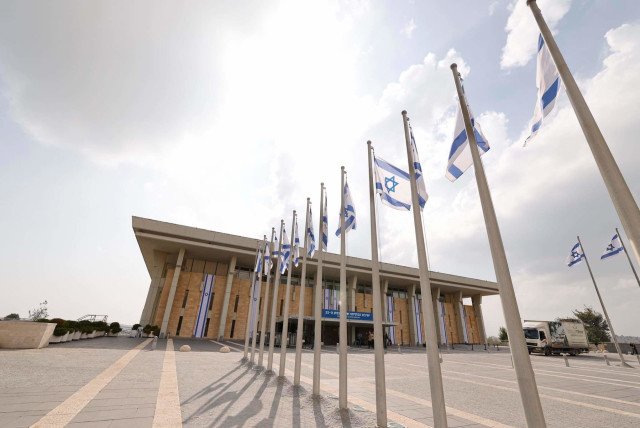Israel's democracy is under threat, a majority of Israelis say - poll

This belief differs greatly across the political spectrum, with 94% of the Left, 71% of the Center, and just 38% of the Right expressing this opinion.
Fifty-four percent of the Jewish Israeli population said that they believe that democratic governance in the country is "in grave danger," according to an Israel Democracy Institute poll released Tuesday.
This belief differs greatly across the political spectrum, with 94% of the Left, 71% of the Center, and just 38% of the Right saying that Israeli democracy is under threat.
Over three-quarters of Israeli Arabs think that Israeli democracy is under threat, the poll found.
The poll also examined public trust in the country's institutions, finding that the IDF continues to be the institution the public trusts most (77%), while political parties are trusted least.
The Knesset and government also have low rates of public trust, with just 16% saying they trust the Knesset and 25% saying that they trust the government.
Levels of trust in the media are also low, with just 26% saying that they trust the media.
Israelis trust the court more than the government
Of the three branches of government, the judiciary is most trusted by the public, with 39.5% expressing trust in this branch.
Acting President of the Supreme Court of Israel Yitzhak Amit commented on public trust in the judiciary Tuesday, saying " In recent years, there has been an attempt to present a distorted picture, suggesting that the erosion trend is unique to the courts and stems from their conduct, while obscuring the overall erosion of public trust in all government institutions."
"This is a deliberate attempt aimed at undermining public trust in the judiciary and does not align with reality."
Trust in the Israel Police stood at 37%, and trust in Israel's president stood at 38%.
In spite of the fact that a large majority of the public expressed trust in the IDF, only a slim majority of Jewish Israelis said that they believe that the IDF is politically neutral. Less than one-third of Arabs believe that the IDF is politically neutral, the poll found.
When looking at public trust in police, around two-thirds of both Jewish and Arab Israelis believe that the police are not politically neutral.
"The decline in public trust between Israeli citizens and state institutions, reflecting a trend that has become even more pronounced over the past year, deeply troubles me," said President Isaac Herzog, commenting on the study which was presented to him Tuesday.
"We must act to restore public trust in the state and its institutions. Trust is the greatest asset of any nation. At a time when many are concerned about the erosion of democratic values in Israel, I want to emphasize: Israeli democracy has no substitute," he added.
IDI President Yohanan Plesner also commented on the erosion of public trust, calling it a warning signal and an expression of the fact that Israelis do not think their government is working for them.
"Israelis see their leaders focusing more energy on ensuring the ultra-Orthodox don't have to serve in the military than on tackling the rising cost of living or addressing the plight of Israel’s displaced populations. They see that instead of building internal cohesion to confront our many enemies, our leaders are expending political capital on removing checks and balances, harassing competent civil servants, and promoting cronies," he said.
"The irresponsible weakening of institutions that have served as a source of Israel’s strength and prosperity for decades is a dangerous phenomenon, especially in time of war. Our leaders have much work to do, and time is of the essence.”
The poll also examined Israeli attitudes towards how to ensure the country's security, finding that in recent months, there has been a drop (from 40% to 30%) in the percentage of respondents who think that strengthening Israsel's military power will best ensure security in the short term.
The percentage of those who think that diplomatic solutions will better secure the country increased from 19% to 28%.
Looking at long-term security, around 40% said that both strengthening Israel's military and reaching political agreements are equally important for ensuring the country's security.
"Despite the turbulent events of the past year, this year's Index does not indicate sharp fluctuations or changes in trends compared to the 2023 Index. The public remains dissatisfied with the political echelon, and the gaps on key issues between political camps remain the same," said Viterbi Center for Public Opinion and Policy Research Director Professor Tamar Hermann.
"The feeling that Israeli democracy is in danger is especially widespread on the Left and in the Center, but a large minority also feels this is the case on the Right," she added.
"Despite everything, a majority believe that Israel is a good place to live and would prefer to stay here, even if they were offered immigration."
Polling for the survey was conducted in May, with some questions revisited in October as events developed, the IDI explained.
Two firms carried out polling - Shiluv I2R and Afkar Research and Knowledge. The Dialogue Research and Polling Institute conducted validation of some of the findings.
Jerusalem Post Store
`; document.getElementById("linkPremium").innerHTML = cont; var divWithLink = document.getElementById("premium-link"); if (divWithLink !== null && divWithLink !== 'undefined') { divWithLink.style.border = "solid 1px #cb0f3e"; divWithLink.style.textAlign = "center"; divWithLink.style.marginBottom = "15px"; divWithLink.style.marginTop = "15px"; divWithLink.style.width = "100%"; divWithLink.style.backgroundColor = "#122952"; divWithLink.style.color = "#ffffff"; divWithLink.style.lineHeight = "1.5"; } } (function (v, i) { });

